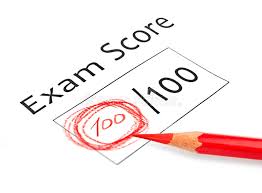Irrespective of your performance on an exam, don’t take it personal especially if you’ve just bombed it. Your grade on an exam isn’t a true reflection of your intelligence or identity. It probably demonstrates your readiness for the exam, and hopefully you’ll do better as you get more prepared for subsequent exams. Having said that, here are some things to do after an exam:
1. Go over your graded exam: Never miss an opportunity to go over your exam after it has been graded. Doing this may be unpleasant at times, but it is worth the effort especially if you plan to perform better on subsequent exams. There are two main reasons you want to do this though. For one, questions on an exam (for example, first or second term exam) may reappear on the final exam (maybe not exact questions but similar) because in most cases exams covers the entire semester’s work. Thus, if you fail to learn from your mistakes on a particular exam, you’ll likely repeat the same mistakes on the final. Secondly, it hurts to not know what you don’t know since you can’t improve on something you are unaware of. Remember, you are committed to a lifestyle of learning, part of which requires that you learn about what you know little or nothing of, so you can improve on it.
2. Don’t miss the review/correction session: Usually on the next lecture after the exam, the prof will talk about the results from the exam and possibly return the exam scripts back to the students. After that, the prof reviews the exam questions and supplies the ideal answers to those. This is a great time to learn so you can do better on the next exam.
3. Meet with the prof in case of any complaints: If after looking through your graded exam paper you feel you deserve more marks for a question or two, then don’t hesitate to approach your professor. One thing though, be polite when you meet with the professor to discuss concerns about your grade; don’t burst into his or her office demanding a grade boost as you’d likely not get it this way. Even if you don’t receive the extra marks you were hoping for, still find out from the prof what you did wrong and what you could do to get a better grade moving forward.
4. Apply the zero-based thinking approach: Once you have admitted your mistakes on the exam, it is time to apply the zero-based thinking technique. Basically, it says that knowing what you know now, what would you do differently if you have to start things over again. When applied to exams, it will read something like this: based on what you’ve learnt from your errors on the recent exam, what will you do differently on the next exams. Here are some examples to help you:
- “I didn’t finish up the exam, so on the next exam I’ll budget my time efficiently and not linger over a single question.”
- “I made really silly mistakes, so on the next exam I’ll make sure to review my answer sheet a couple more times before submitting.”
- “I received half mark on a question because I didn’t show my working. Going forward, I’ll have to show all my working on my exams.”
- “I got so thirsty and uncomfortable that I had to leave the exam hall to buy a bottle of water; I lost some time doing this. Henceforth, I’ll always carry along with me to the exam hall a bottle of water.”
You get the idea – right? Take some time to agree on what you’ll do differently considering the errors you committed on the most recent exams.
With the tips and guides spelt out here, you’ll be well on your way to preparing optimally for and acing upcoming exams.
To your success!
